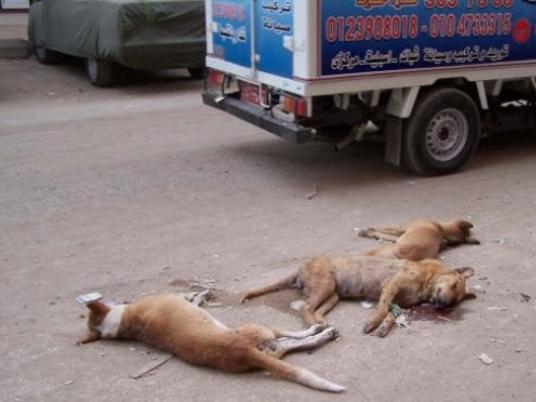A small crowd gathered around a colorful pile of bright red and green hot chili peppers would not be so unusual in a typical Cairo marketplace. But in the center of the Mostafa Mahmoud Square in Cairo’s upscale Mohandessin district, directly across from the prominent mosque of the same name, it caused quite a stir.
The two-meter stack of peppers, which captured the hungry eyes of passers-by, was erected on Sunday by People for the Ethical Treatment of Animals (PETA) in order to promote a vegetarian lifestyle. At the center of the pile of peppers was a sign that read: “Spice Up Your Life: Go Vegetarian.”
“It’s not about promoting hot peppers specifically,” said Nadia Montasser, one of the two “Chilli Chicks” accompanying the campaign. “The peppers are just a symbol to represent fruits and vegetables and to get people’s attention.”
The “Chili Chicks”–replete with red tights, black mini-skirts and red hot chili necklaces and preaching a meatless-diet–stood in stark contrast to local women wearing traditional abayas and niqabs. Many of those present stood ready with empty boxes atop their heads, anxiously awaiting the go-ahead to stock-up on the coveted household spice.
Even if the majority of those gathered were only there for free handouts, the PETA activists nevertheless felt they had achieved their purpose.
“The point is to trick people into reading our pamphlet,” PETA representative Jason Baker told Al-Masry Al-Youm. “If we just came out here with signs and chanted, no one would remember a thing. But this makes an impression.”
The pamphlet, which PETA volunteers distributed at the event, explains to readers how a vegetarian diet can benefit one’s health, help the environment and limit cruelty to animals–the latter being PETA’s overriding concern.
Baker, who pointed out that there were enough crops in the world to comfortably feed the entire human population, said that both land and crops were used inefficiently when employed to feed livestock.
“This limits the effectiveness on a ratio of 16 to 1,” said Baker, explaining that cows eat 16 kilograms of grain for every 1 kilogram of edible meat which is produced.
Even though there are many arguments in favor of vegetarianism, PETA emphasizes the issue of animal rights.
PETA’s pamphlet appeals to the Koran to argue that “animals are communities and nations unto themselves; they are more than just resources for us.” But, unfortunately, today, “animals are treated as nothing but machines.” Meat that is referred to as Halal, while intended to be more humane, is often far from being so, activists claim.
PETA has been active in Egypt for the last few years. It caused a stir in February of 2007, when Baker, dressed as a wounded chicken, alongside Montasser, PETA’s Egyptian representative, picketed a branch of KFC to protest the unethical standards of its treatment of chickens.
“Most fast-food chains at least uphold a minimum standard, but KFC goes below that,” said Baker.
The demonstration angered KFC officials, who knocked Baker over and removed his chicken head. The scuffle ended up with both Baker and Motasser being forcibly removed by security.
The pile of chili peppers certainly represented a less controversial approach, although it was not without its share of pushing and shoving. PETA volunteers succeeded in keeping spectators from attacking the pile just long enough for the local media to snap pictures.
The entire mound disappeared within a few minutes, and many left the scene with heavy loads on their heads and smiles on their faces.




